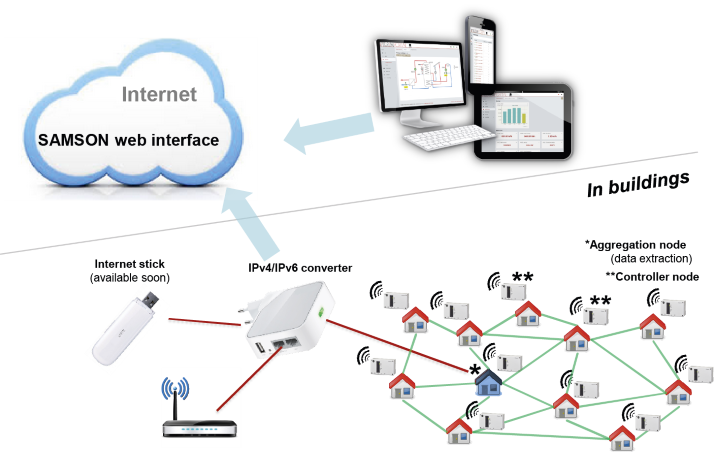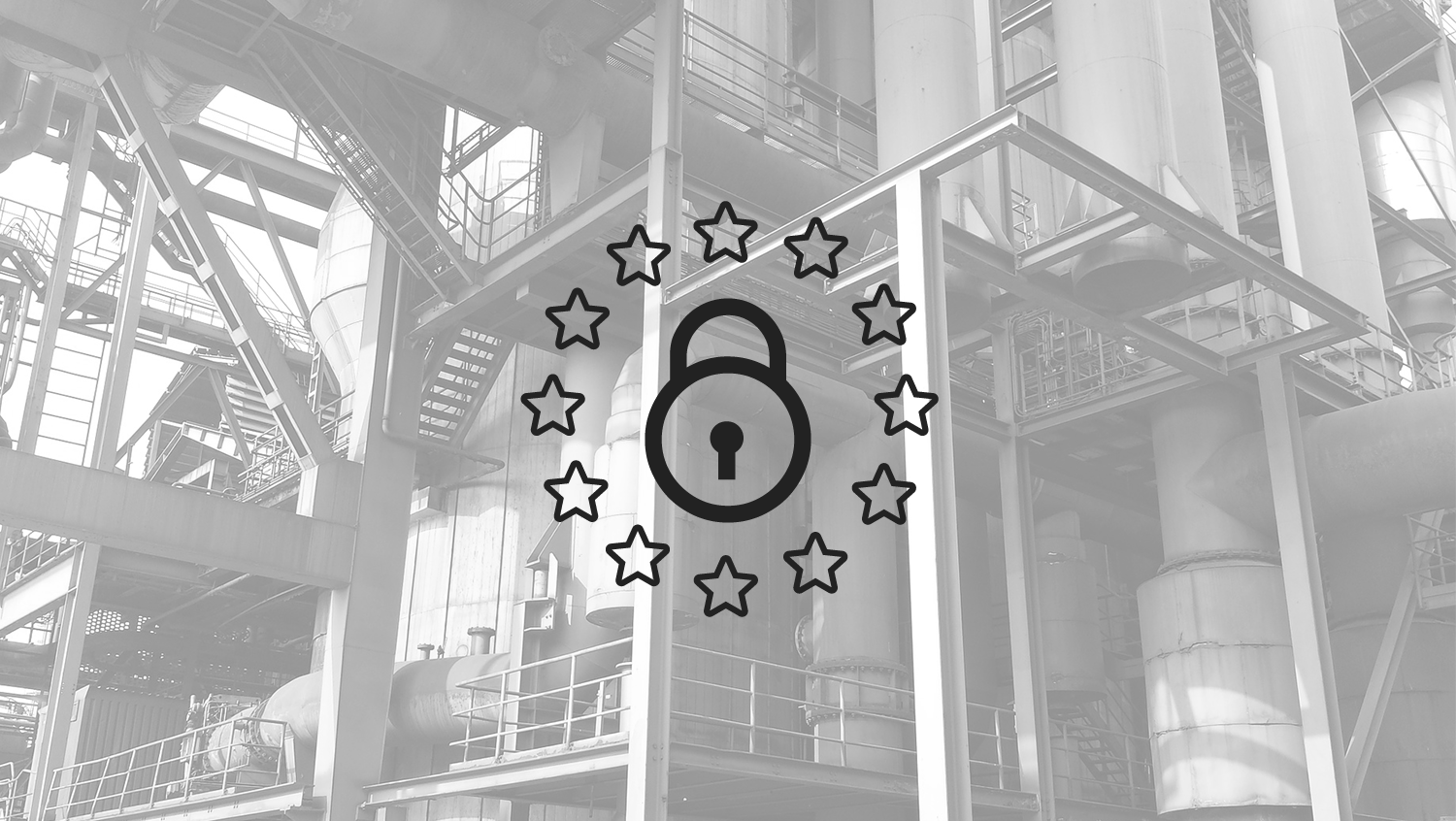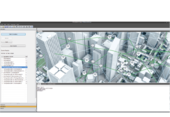SAM-LAN: the wireless network for local and district heating systems

DYNAMIC SMART WIRELESS
SAM-LAN is the new, innovative wireless network technology by SAMSON. SAM-LAN can be used in existing or new properties without the need for additional communication cables (e.g. underground cables).
The smart, dynamic wireless network connects all house substations over unlicensed radio frequency bands. SAM-LAN allows cost-effective management and control of local and district heating substations in properties. Integrated functions, such as remote maintenance access, simple data handling, and consumption metering, are additionally available to support users.
Technology
The SAM-LAN wireless technology was developed for use with SAMSON heating controllers. The stand-alone network is particularly dynamic and flexible.
Thanks to ingenious software, the RF gateways used form dynamic, flexible wireless networks without having to rely on external providers. The topology of the wireless network provides several routes to forward data. The SAM-LAN wireless mesh network impresses through its self-configuring and self-healing capabilities.
- Simple: fast installation (plug and play)
- Convenient: control and remote maintenance access
- Universal: remote monitoring in urban and rural areas
- Reliable and stable: communication through brick walls and from basements
- Versatile: use with district heating stations (heating controllers, utility meters) as well as other end devices
Special features
- Internet of Things (IoT) using IPv6
- Meshed network with multi-hop communication
- Dynamic routing
- Access points to the wireless network (aggregation nodes) with 80 wireless nodes (600 data points each)
- Firmware update (over-the-air update)
Wireless technology
- LoRa Alliance technology: using ISM band (869 MHz)
- Range depending on attenuation
- Multiple antenna system (various antennas possible)
Data security
- Access point/broadband connection: TLS encryption
- Wireless network: AES-256 encryption
Data communication
- Data rate up to 100 kbit/s
- Continuous data aggregation
The web portal SAM DISTRICT ENERGY serves as central platform to visualize your applications. This interface provides maximum transparency of all (heating) controllers, utility meters, and any other components within the SAM-LAN wireless network. Besides the (remote) management of district heating stations, numerous other functions are integrated:
- Processing and forwarding of utility meter data
- Fault management
- Analysis of historical data
- User administration etc.
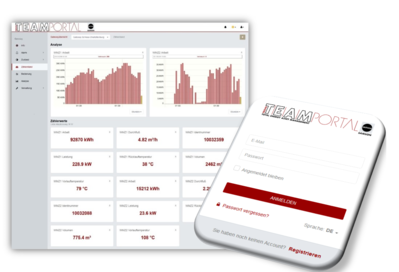
The RF gateways can be easily configured for the wireless network over the integrated web server. Possible configuration of the network nodes includes:
- Aggregation node (data collection and extraction)
- Peripheral node
- Wireless repeater
Additionally, the wireless network is encrypted (AES-256). Once configured, the web server assists users during start-up and optimization of the wireless network.
Application
SAM-LAN offers a wide range of applications, for example, in the local and district heating market. SAM-LAN provides a cost-effective management and control of new or existing properties connected to local and district heating networks. The data exchange over SAM-LAN helps save energy and optimize existing systems.
SAM-LAN is state-of-the-art technology for simple, user-friendly networking of house substations. The system provides numerous benefits:
- Easily upgradable system
- No additional cost resulting from third-party suppliers
- Energy management (operational and cost optimization)
- Continuous monitoring (e.g. return flow temperatures)
- Fault management
- Simultaneous connection of heating controllers and utility meters
Data generated by (heating) controllers and utility meters in the wireless network are continuously logged. These data are forwarded cyclically to the web portal SAM DISTRICT ENERGY for visualization:
Heating controllers:
- Logging of current plant data (e.g. flow and return flow temperature)
- Display of all existing plant schemes
- Access and change of controller parameters
- Manual override (pump and valve control)
- Others
Utility meters:
- Flow rate
- Volume
- Capacity
- Work
- Flow temperature
- Return flow temperature
- ID number
The SAM-LAN wireless network is already in use in a residential area (Paul-Hertz-Siedlung) in Berlin-Charlottenburg. The settlement covers an area of more than 500,000 m², on which over 120 buildings have been built.
The existing district heating stations have been fitted with SAMSON controllers from the TROVIS 5500 Automation System. Over 60 domestic substations are operated using an aggregation node and broadband connection. Additionally, the different buildings are visualized, managed, controlled, and serviced.
The meter data from the district heating stations are additionally logged using the meter bus interfaces of the RF gateway without controller.
Cooperation partners:


Products
Various SAMSON components are available for use with SAM-LAN. The SAM LAN Gateway serves as hardware for wireless networking of SAMSON (heating) controllers, for example. The special SAM LAN Network Planner software tool supports users in planning the network. The new web portal SAM DISTRICT ENERGY, the SAMSON's business solution for local heat and district heating, is used for visualization and includes additional functions.
SAM LAN Gateway
The SAM LAN gateway allows wireless networking with a mesh structure. The wireless technology works on the ISM band (869 MHz). Remote polling and control of heating and district heating controllers and/or utility meters (max. 3 M-Bus loads) is implemented using unlicensed radio frequency bands. In addition to a LAN port (configuration/broadband connection for aggregation nodes), it has an antenna jack (SMA). It allows the connection of an optional external antenna. The hardware fits neatly into the range of accessories for SAMSON heating controllers. The LEDs on the device provide a clear indication of the device status.
SAM-LAN Network Planner
The software was specially developed for SAM-LAN and supports users in planning and starting up their own wireless networks. The metadata serve to manage customer-specific data. Through the integrated simulation function, the appropriate network structure is found and the ideal position of the aggregation node in the network calculated. The network analysis shows the actual state of the radio network and monitors the quality of wireless network connections.
Functions:
- Planning
- Network simulation
- Start-up
- Network status analysis
SAM DISTRICT ENERGY
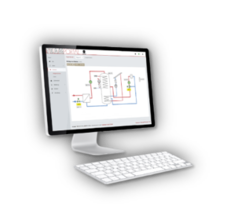
The web portal SAM DISTRICT ENERGY allows an all-round, transparent display and overview of all controllers and end devices in the SAM-LAN wireless network. Through the access to individual controllers, it is possible to set and change control parameters and time schedules as well as poll all heat meters (meter readings). The logging functions allow trends, alarms, and parameters (selectable as required) to be logged. These data can be used for statistical purposes.
Communication with controllers is possible from anywhere and with any mobile device.
This might also interest you
Headquarters
SIL
Pilot valve
Media
Self-operated regulators
SAM GUARD
Valve accessories
Executive Board
Positioners
Industry 4.0
Conference
Hook-ups
Valves
Volume boosters
Vocational training
Supervisory Board
MainChange
Actuators
Hydrogen
SAM DIGITAL
Lock-up valve
Subsidiaries
Quick exhaust valves
Sales offices
Differential pressure meter
SAM TANK MANAGEMENT
Careers
Service
Solenoid valves
Digitalization
Supply pressure regulators
SAM DISTRICT ENERGY
FDI
Commitment
Globe valves
Automation
Seminars
SAM LAN
Control valves
Limit switch
Automation systems
